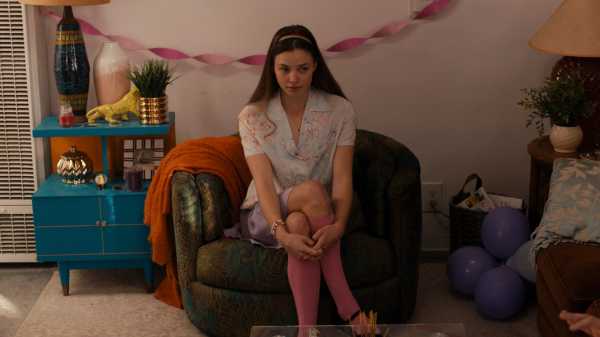
Lena Dunham was all of twenty-three when “Tiny Furniture” premièred, to apt acclaim, at South by Southwest in 2010. It’s a first-person comedy centered on the moral price of the artistic ambition of its protagonist (played by Dunham). She knew. Rather than moving stepwise into her next feature, Dunham created and starred in “Girls” and thereby moved into the forefront of the culture and even changed it—she became a C.E.O. and a celebrity at an early age. No longer just a filmmaker, she became a voice of a generation, pushed into a public role that defied, outran, and maybe even impeded her artistic development. Meanwhile, she also endured, very much in the public eye, severe health issues, including Ehlers-Danlos syndrome, endometriosis, and a hysterectomy. In her second feature, “Sharp Stick” (which opened last Friday), Dunham puts medical crises in the foreground. The film tells the story of a twenty-six-year-old woman named Sarah Jo (Kristine Froseth), who, after an emergency hysterectomy at fifteen and menopause at seventeen, becomes repelled and embarrassed by her own body and inhibited about pursuing any romantic or sexual relationships. But it’s also a story of the knowledge gap, of the feeling of being, in effect, an emotional and experiential virgin—of being in one’s mid-twenties and knowing little of the world, and of filling in the gaps by way of one’s own scant inner store of discernments and chaotic inner store of impulses.
In “Sharp Stick,” Dunham forces a flood of experience and pain into a compact vessel. Despite its apparent external realism, broken only by a few brief, mostly animated, fantasy sequences, the film is a hermetic drama of a world apart, a fairy tale: Sarah Jo is growing up in a sealed-off gynecocracy. She lives with her older sister, Treina (Taylour Paige), and their mother, Marilyn (Jennifer Jason Leigh), in a quirkily decorated apartment that’s part of a small building where Marilyn is something like the manager. The three women are bound together with a centripetal intensity, in a hothouse of family mythology that Marilyn herself cultivates and tends. She is a functional shut-in, cut off from life at large. Married five times, speaking freely of her flamboyant sexual past, Marilyn regales Treina and Sarah Jo with their “origin story”—of how she came to adopt Treina, of how she conceived Sarah Jo, of how she became the sole parent to both.
The movie that “Sharp Stick” most resembles is “Kajillionaire,” in which Miranda July depicts a family as a smother-bubble of planned ignorance and virtual gaslighting. But, where the parents’ motive in July’s film is mercenary, in Dunham’s it is love. Sarah Jo and Treina are trapped in a bubble of affection and a private cult of triangular codependency, one that’s centered on tales of men but that excludes them. Treina, an aspiring actress-slash-influencer, is in a relationship with a man whose worth is proven, to her, by his stated devotion to her family (whom he has never met). Sarah Jo appears to have no extramural social life at all; she works as an aide to special-needs children, currently to a boy named Zach (Liam Michel Saux), who has Down syndrome. A compassionate, imaginative, and attentive caregiver to Zach, Sarah Jo has also become an integral part of his family’s household: his mother, Heather (Dunham), a real-estate agent, who is pregnant; and his stay-at-home father, Josh (Jon Bernthal), who seems stuck in a perpetual adolescence and whose life revolves around the hustle of his hipsterama friend Yuli (Ebon Moss-Bachrach).
Josh, who’s deeply devoted to Zach, jukes and jives around the kitchen, speaking in an overblown, hyper-enthusiastic patter while making white-boy hip-hop theatre out of pancakes and dance breaks. He is literally the only man in Sarah Jo’s life—and, raising her dress to show him the scars on her stomach, telling him that she’s a virgin, she expressly asks him to have sex with her. What emerges (avoiding spoilers) is that Sarah Jo also knows little about sex, in general. Despite growing up in the heady atmosphere of her mother’s tales of a freewheeling past, she doesn’t know what some ordinary sexual acts are, and has seemingly never experienced sexual pleasure at all. She is possessed by a horror of her own body, which has kept her from confronting sex as a reality, whether physically or even intellectually. With Josh, she has her awakening of pleasure.
Among Dunham’s most distinctive perceptions and most daring creations, in “Tiny Furniture” and “Girls,” are her visions of the awkwardness and vulnerability of sex. She counteracts the depressingly facile conventions of sex scenes (cutting from a kiss to quick, pneumatic humping) with her attention to time, process, negotiation, discussion, and unpleasantness—to the vast emotional risks that it entails, to pleasure as an achievement rather than a given, and to the inseparability of displeasure and embarrassment from gratification. In “Sharp Stick,” Sarah Jo’s encounters with Josh extend those ideas in audaciously protracted and detailed scenes, which Dunham films with an insistent restraint that concentrates their vast dramatic importance in gestures, expressions, hints, and overtones.
Josh also introduces Sarah Jo to online pornography. (The plausibility that she’d been living in ignorance of it comes off less as a plot-driven necessity than as a reflection of her repudiation of everything having to do with sex.) When her relationship with Josh goes south and she finds herself alone again and unemployed, she fixates on a porn star (Scott Speedman), whose films provide both a realm of fantasy and a realm of fact—a theoretical knowledge of sexual possibilities that she’s never heard of, never imagined, and now decides to explore. Here, “Sharp Stick” connects with another sexual coming-of-age film, “Superbad,” in which porn-obsessed teen-age boys learn that there’s no such thing as theoretical knowledge, and that what they have to learn is emotional, not technical.
The fairy-tale aspect of “Sharp Stick” renders this element of the story too briskly and simply; the parts of the film involving Sarah Jo’s quest of sexual experience are rushed, breezed by, diminished—as is the interpersonal, emotional part that inevitably comes into play. Dunham’s ideas emerge, even so: Sarah Jo’s coming-of-age takes place in a laboratory-like compression of what, for most people, is the decade-plus of adolescence and early adulthood. Moreover, her managed checklist of sexual adventure is inseparable from her quest for a self, one that reaches beyond the confines of home and of family—of a closed world of women, of a fatherless retreat. “Sharp Stick” is a story of Sarah Jo’s struggle to define, in the face of physical and personal circumstances, her own identity, and what it takes to do so is sex—and the touchstones for her undiscovered, even unsuspected, traits are men. In Dunham’s female-heterosexual mythological fantasy, fathers are the centrifugal force, and men are the way into the world—a world of pain, and also of pleasure, but the real world nonetheless. ♦
Sourse: newyorker.com






